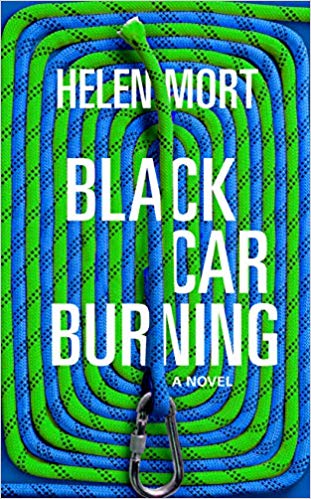People didn’t know what to make of each other any more. People didn’t know what to make of themselves. And you couldn’t explain that away. You couldn’t say that this was a bad area. You couldn’t blame unemployment. You couldn’t blame the EDL with their march and their rootless anger and their banners. You couldn’t blame the small houses and the narrow streets. Eva was right. People see what they want to.

How best to sum up this book? There is an ex-police officer in this novel as well as a serving one, yet to call Black Car Burning a crime novel would be to stretch the envelope some distance beyond what even that most accommodating of genres could reasonably stand. It is a novel about landscape that is inalienably about a city. It is a novel haunted by violence in which the dominant role is played by compassion. It is a prose work written by a poet. It is poetry in the form of prose.
In Black Car Burning we meet Alexa, a serving police officer who keeps having nightmares about Hillsborough, a crime that was committed while she was still a small child. Alexa’s father is Pete, who resigned from the police force in the immediate aftermath of Hillsborough and resigns from being Alexa’s dad when he finds he cannot accept her polyamorous relationship with Caron and Leyton. Pete now works in a shop selling climbing gear with Leigh, who thinks she is falling in love with Caron. Caron is in love with Black Car Burning, a notoriously difficult climbing route that tests the nerve as well as the physical stamina of most climbers.
Above and behind them all, the gritstone of Stanage. At their feet, the city of Sheffield, scarred by Hillsborough, its rapidly evolving communities stretched almost to their limit by increasing austerity.
I was writing to a friend about this book the other day and the word they used to describe it was humane. Black Car Burning is one of the most deeply humane explorations of community, class, history, landscape and the absolute now that I have read. I have not felt so deeply, so personally invested in a novel since Sarah Hall’s The Wolf Border. Black Car Burning is more difficult, more austere than The Wold Border but it is equally the kind of writing that might save us.
It is no coincidence that Helen Mort has chosen as the epigraph for Black Car Burning a quotation – a radiantly humane one – from M. John Harrison’s 1989 novel Climbers. It must be a coincidence that Black Car Burning happens to be published exactly thirty years after Climbers – writers don’t plan these things – but what could be more fitting, more beautifully apposite? The huge changes that have taken place in those decades – in the climbing community, in the makeup of both our urban and rural environment, in the political climate, in who might be writing about climbing, and landscape, and the feel of granite dust under the fingernails – are searingly observed and catalogued in these two novels, framing the late Thatcher period with Late May like bookends, revealing also and as importantly the ways in which little has changed, the ways in which, though lost, we can still fight, we can still come together, we can still show that we see what is happening, and do not consent.
How significant and how hopeful it is that Black Car Burning was written by a woman. I took to the book so immediately and so naturally it never occurred to me, through at least half the reading of it, to frame it to myself in those terms. But it is important, and it is worth saying.
Please love this book with all your hearts. It is a keeper.